Mary Stewart (B.1909-) : War and Memory
Although Mary lived through both World War One and World War Two she does not choose to discuss either event in much detail throughout her memoir. It is referred to as a smaller part entwined in other themes, rather than being an iconic feature itself.
Mary’s first reference to the War is within the opening lines of her memoir. Mary was only five years old at the outbreak of World War One and yet she obtains a vivid memory of her father and mother’s role. Her father, she notes was: “..in the terriers, so one of the 1st to be called up 1914.” [sic] The terriers that Mary speaks of were the Territorial Battalions, built upon thousands of men from Lancashire, who volunteered themselves to serve overseas at the outbreak of the War. They took a key role in the service of the Great War as Mary states and were a huge part of front line defense in the Western Front.
Image: A trench message dog of the 10th Battalion, Manchester Regiment
The death toll from World War One was unimaginable, with thousands of British men not returning to their families at all. The death of Mary’s father would have in fact left her as an orphan of war. Although Mary’s father returned a rather changed man and not for the better, his return at all was probably viewed as a miracle.
The table below shows the casualty and deaths across the world as a result of World War One; a very sad set of statistics indeed. (Although it is almost impossible to obtain exact figures, this gives us an idea of the devastation the war had across families of all classes across Britain)
The impact of War not only takes her father away from his young family, but also her mother. During World War One, the traditional ideals of the family were completely overturned. Many British women felt it was their duty, whilst their husbands were away at war, to become the sole breadwinner for their growing families. The traditional domestic sphere of a women’s place within the home very slowly began to disappear; an ideal of the past. An iconic figure, Vera Brittain, who served as a voluntary aid nurse in World War One noted in her diary: “He has to face far worse things than any sight or act I could come across, he can bear it all – and so can I.”(154)
Like many women of the time, Mary’s mother also took on a job to support her young family, at the Collyhurst Smarts Cotton waste place. She worked in the hope of buying a “..new sideboard..” for her husbands happy return. Sadly, Mary’s life would change forever due to the circumstances her family had been left in in war time Britain. “She & 5 other women fell down whilst unloading a lorry of bales of cotton… my mother, slim as a wand, her neck was broken.” This left Mary’s family in a terrible position as they now had no bread winner at all to support the home and not even a strong male figure to support the emotional children. “His birthday 28yrs was on 26 March. Mother died on the 22nd..”[sic]
This traumatic time in Mary’s life is made somewhat worse as she explains: “.. with 4 children & her husband abroad. Not like today, when they fly them home for trivial things, we didn’t see him till after the war was over.” Mary and her siblings were left parent less and forced to live with their Paternal Grandmother until their fathers return.
The effects of the War were not only immediate but long term. Mary describes her fathers rapid decline upon his return, a lost soul, right up to the point of his suicide at the young age of just 41: “They were loving parents who idolised each other & their children, but the loss of his beloved wife floored him, & from being a kind father he became horrible…”[sic] Mary’s description of her post-war father is somewhat different from the kind and hard working man she originally introduces us to.
The War plays a huge part in Mary’s life and it is possibly emotional stress why she chooses not to discuss it in any great detail within her own memoir. We still get a clear view however of just how devastating it must have been for this young family and also the immediate family around them.
- Image One: (last accessed 4th January 2013)
- Image: (last accessed 4th January 2013)
- Brittain, V. (May 21 2005 – reissue edition), Testament of Youth. Penguin Classics. (p154)
- Stewart, Mary. Burnett Archive of Working Class Autobiography, University of Brunel Library, 2-741




Leave a Reply